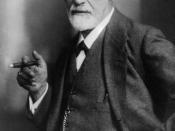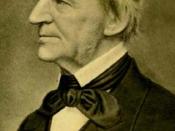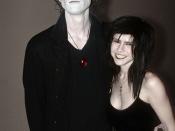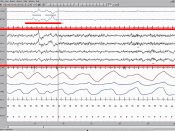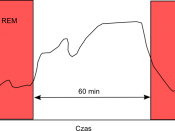Dreams Dreams have fascinated every culture that has ever existed. Dreaming is a form of mental activity that is different from waking thought because it occurs during sleep. Dreams are more perpetual than conceptual: things seen and heard rather than regular thought. Visual experience is almost always present in all dreams, auditory experience in about forty-five percent of dreams, and there is very little touch, taste, smell or pain in dreams. A considerable amount of emotion is commonly present in dreams, usually a single stark emotion such as fear, anger, joy rather than modulated emotions that occur in a waking state. Most dreams are in the form of interrupted stories, made partly of childhood memories.
Ancient cultures believed dreams were spiritual in origin, often foretelling the future. Aristotle believed that dreams "originated from within the dreamer, arising from the heart"(Stumpf 143). This is what the Anthology deals with, hope and aspirations.
Modern dream research has focused on two general interpretations of dream content. In one view, dreams have no inherent meaning but are simply a process by which the brain integrates new information into memories. In the other view, dreams contain real meaning symbolized in a picture language that is distinct from conscious logical thought. At the beginning of the 20th century Sigmund Freud proposed that a mental process quite different from that used in the waking state "dominates the dreaming mind." He described this "ÃÂprimary process' as characterized by more primitive mechanisms, " by rapid shifts in energy and emotions, and a good deal of sexual and aggressive content derived from childhood" (Stumpf 210). In 1953, American sleep researchers Eugene Aserinsky and Nathanial Kleitman presented studies that showed that a dream doens not consist of fleeting imagery that occurs while a person awakens from sleep, but instead a dream takes place during a biological state of it's own. There are two states of sleep that exists: no-dream sleep (NREM-sleep) and dream sleep(REM-sleep) Studies show that a person has four to five periods of REM-sleep lasting about five to twenty minutes during the night at about ninety minute intervals that constitute twenty-five percent of the nights sleep in an adult; However as much as fifty percent of a young child's sleep in REM-sleep. The following poems pay close attention to the hopes and aspirations of children, because as Robert Weaver said, "Youth is Pleasure." Dream By Hilda Doolittle You don't even know What a dream is; How did it come? It didn't come, It was there.1 Hold Fast Your Dreams By Louise Driscoll Hold fast your dreams! Within your heart Keep one still, secret spot Where dreams may go, And sheltered so, May thrive and grow"" Where doubt and fear are not.
Oh, keep a place apart Within you heart, For little dreams to go.2 He Had His Dream By Paul Laurence Dunbar He had his dream, and all through life, Worked up to it through toil and strife.
Afloat fore'er before his eyes, It colored for him all his skies: The storm cloud dark Above his bark, The calm and listless vault of blue Took on its hopeful hue, It tinctured every passing beam"" He had his dream.
He labored and failed at last, His sails too weak to bear the blast, The raging tempest tore away And sent his bleating bark stray.
But what cared he.
For wind or sea! He said, "The tempest will be short, My bark will come to port." He saw through every cloud a gleam"" He had his dream.3 The Dreamer By Paul Laurence Dunbar Temples he built and palaces of air, And, with the artist's parent-pride aglow, His fancy saw his vague ideals grow Into creations marvelously fair; He set his foot upon Fame's nether stair.
But oh, his dream,--it had entranced him so He could not move. He could no farther go; But paused in joy that he was even there! He did not wake until one day there gleamed Thro's his dark consciousness a light that racked His being till he rose, alert to act.
But lo! What had he dreamed, the while he dreamed, Another, wedding action unto thought, Into the living, pulsing world had brought.4 Untitled By Ralph Waldo Emerson Dear are the memories Of unreturning years, And griefs recalled delight not less, Youth's terrors & it's tears.5 Harlem By Langston Hughes Does it dry up like a raisin in the sun? Maybe it just sags like a heavy load.
Or does it explode?6 A Dream By Maggie Pogue Johnson I had a dream one winter's night, It filled my soul with pure delight; Ne'er ran my tho'ts in strain so sweet, I'm filled with rapture to repeat.
Oh could I dream that dream again, "ÃÂT would be a song, a sweet refrain; Oh could I wake to find it true, "ÃÂT would then my happy thot's renew.
Dreams, sweet dreams of the past, Which o'er our lives bright shadows cast; Yet, sometimes in their course they change, And pleasure clouds they disarrange.
What disappointments we do meet, In dreaming dreams, yea, dreams so sweet; Joy and happiness flow in streams,-- We wake to find it but a dream.
What is this mysterious way In which we think we spend a day, Awakening ourselves amid delight Finding out "ÃÂtis not day but night.
"ÃÂTis a fancy which o'er us does creep, When in that state of rest called sleep, The light of imagination which does beam And form what we always term a dream.
A dream is a miniature life, Often lived in a single night; When pleasant, this tho't oft does gleam, Oh could we live just as we dream.7 Dreams in the Dusk By Carl Sandburg Dreams in the dusk, Only dreams closing the day And with the day's close going back To the gray things, the dark things, The far, deep things of dreamland.
Dream, only dreams in the dusk, Only the old remembered pictures Of lost days when the day's loss Wrote in tear's the heart's loss.
Tears and loss and broken dreams May find your heart at dusk.8 Age and Youth By William Shakespeare Crabbed age and youth cannot live together: Youth is full of pleasance, age is full of care; Youth like summer morn, age like winter weather; Youth like summer brave, age like winter bare.
Youth is full of sport, age's breath short; Youth is nimble, age is lame; Youth is hot and bold, age is weak and cold; Youth is wild, age is tame.
Age, I do abhor thee, youth I do adore thee; O! my love, my love is young: Age, I do defy thee. O! sweet shepherd, hie thee, For methinks though stays too long.9 In Youth is Pleasure By Robert Weaver In a herber green, asleep where I lay, The birds sang sweet in the minds of the day; I dreamed fast of mirth and play.
In youth is pleasure, in youth is pleasure.
Methought I walked still to and fro, And from her company could not go; But when I waked it was not so.
In youth is pleasure, in youth is pleasure.
Therefore my heart is surely pight Of her alone to have a sight, Which is my joy and heart's delight.
In youth is pleasure, in youth is pleasure.10 End Notes 1.In the poem "Dream", Doolittle expresses hope and dreams, embedded in a persons subconscious mind. One person is telling another that they do not know what a dream is and proceeds to ask how the dream came. The other replied that "it did not come" rather " it was there." This is what Freud would have said; he believed our subconscious spoke to us through our dreams.
2. Dreams in "Hold Fast Your Dreams" are celebrated. Driscoll talks about dealing with aspirations and with goals. Driscoll says that dreams are important, "hold fast your dream" and that one should keep a place in their heart for them. Dreams give us hope, waking up every morning and living the life we seek. Dreams allow us to get past the bad things or obstacles in life, " where doubt and fear are not".
3. "He Had his Dream" is a poem about keeping faith, and holding onto dreams. Dreams allow us to remain optimistic, to see good in bad, "It colored for him all his skies." Even when the boy failed in achieving his dreams he was OK because he had conditioned himself to be optimistic. Dreams allow us to keep an imagination, to be and see what we wish.
4."The Dreamer" deals with the imagination of a dreamer. Dunbar allows his character to achieve his dream, but get scared when he achieves it, "he could not go". This raises an interesting concept: What does one do when they have achieved their dreams? Is it as they dreamed it would be? If so, is there still hope in life? Or must one get a new dream. What is the best part of the dream, the dream itself, or its culmination? 5. Emerson is looking back on his childhood and calling his thoughts "pleasant". I believe that he is saying that childhood is filled with dreams, hope, and wonderful memories. This ties into the idea that childhood is where most of our dreams are formed.
6.Langston Hughes raises a very interesting question about what happens when a dream is lost or cannot be achieved. Does it just fade away, "drying up like a raisin in the sun", or does it " sag like a heavy load", or does it " just explode"? 7."A Dream" is a poem that sums up the meaning of a dream. We have all had dreams that we did not want to wake from, as well as bad ones when we were glad to awake from them. Johnson expresses the feeling of craving her dreams. "A dream is a miniature life"æ.Oh could we live just as we dream." This poem ties into the idea that what we dream is what we wish, our subconscious talking to us through our dreams.
8.In "Dreams in the Dusk" Sandburg is looking back at his childhood when he was filled with aspiration and hope. These dreams make him sad because it reminds him of better days. This is another poem about not achieving ones dreams and dreams in childhood.
9.Shakespeare hits the nail on the head when he wrote " Age and Youth". He talks about dreams and childhood and what happens when a person gets older. He is expressing how youth is filled with dreams, goals, and hope and how it is in complete contrast with later on in life. When he says " Age, I do abhor thee, youth, I do adore thee." He is talking about how he now yearns for the life of a child.
10.Weaver, like Shakespeare, talk about youth as happiness. He sums it up with his title for the poem, " Youth is Pleasure", because children are filled with fresh dreams and eternal hope. It isn't until they grow older that they realize that maybe they can't achieve all their dreams.
